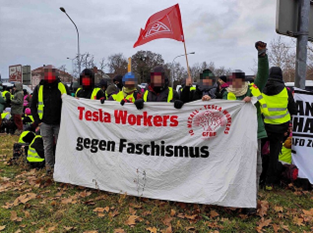Inside Tesla's Gigafactory in Germany

The Tesla Gigafactory in Germany: A Case of Exploitative Labor Practices
The opening of Tesla’s new factory in the East-German town of Grünheide in 2022 marked a significant milestone for the company. However, what has followed is a pattern of intense labor practices that have drawn comparisons to the harsh conditions described by Charles Dickens in his writings on industrialization.
Work Conditions and Worker Struggles
Since its inception, the Tesla Gigafactory has been characterized by high work pressure and a relentless pace. Employees report feeling overworked, with more than 80% of workers indicating they are overwhelmed by the demands of their tasks. Additionally, nine out of ten workers suffer from physical pain related to their jobs, and 91% experience ailments such as back, neck, and joint pain. These issues contribute to an unusually high rate of sick leave, which further exacerbates the challenges faced by the workforce.
Tesla's management has been criticized for its anti-union stance, which has led to intimidation tactics against union members. This approach has created a hostile environment where workers feel pressured to conform to the company's expectations rather than advocating for better conditions.
Wages and Economic Disparity
Despite the high workload, wages at Tesla are significantly lower compared to other German car manufacturers. Monthly salaries start at around €3,200 or $3,720, which is about 10% to 20% below the collective bargaining wages typically seen in the industry. This disparity is particularly stark when considering the immense wealth of Elon Musk, whose net worth is approximately $402.6 billion—roughly equivalent to the GDP of Malaysia.
Tesla’s wage structure not only affects the livelihoods of its employees but also highlights the broader economic inequalities within the automotive industry. While the company has grown to become the largest industrial site in Brandenburg, it continues to operate under a model that prioritizes profit over employee well-being.
Management Practices and Union Resistance
Tesla's management has implemented strategies that aim to undermine union efforts and maintain control over the workforce. These include questioning medical notes, violating privacy, and withholding wages from employees who are sick. Such practices create a climate of fear and resentment among workers, making it difficult for unions to advocate effectively for their rights.
The company's resistance to union participation has led to a situation where workers are often left without representation. This lack of support can be detrimental, especially in a workplace where the conditions are already challenging. The union, IG Metall, has been working tirelessly to address these issues, offering free language courses and pushing for better working conditions.
Language Barriers and Employee Support
Language barriers pose another challenge for Tesla's workforce. While the company offers German language courses, these are often limited in availability and effectiveness. In contrast, the union provides accessible language classes near the factory, aiming to empower workers and improve communication.
Despite these efforts, Tesla's management has continued to resist union initiatives, creating a cycle of tension and dissatisfaction among employees. The company's aggressive tactics have led to increased turnover, with many workers leaving due to the unsustainable work environment.
Calls for Change and Future Outlook
Workers and their union are demanding immediate relief from excessive workloads and an end to the stressful conditions. They seek paid breaks, more staff, and an end to harassment. The goal is to create a workplace where employees can stand upright and support one another without fear of retaliation.
Ultimately, the situation at Tesla highlights the ongoing struggle between corporate interests and worker rights. If the company continues to oppose union representation and ignore collective bargaining frameworks, it risks not only harming its workers but also damaging its reputation. As Noam Chomsky has argued, capitalism often places profits above people, a reality that is evident in the current state of Tesla's operations in Germany.
Post a Comment for "Inside Tesla's Gigafactory in Germany"
Post a Comment